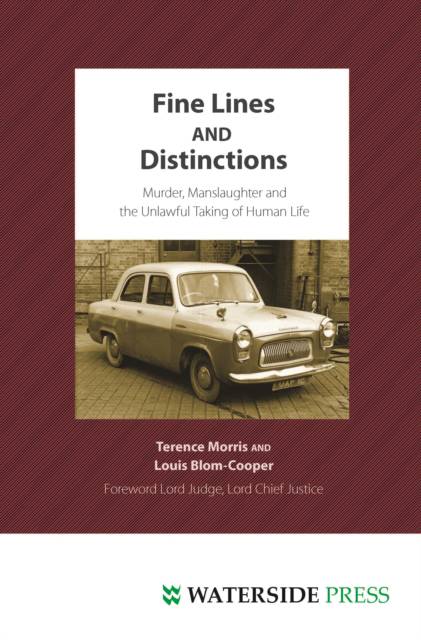
- Retrait gratuit dans votre magasin Club
- 7.000.000 titres dans notre catalogue
- Payer en toute sécurité
- Toujours un magasin près de chez vous
- Retrait gratuit dans votre magasin Club
- 7.000.0000 titres dans notre catalogue
- Payer en toute sécurité
- Toujours un magasin près de chez vous
Fine Lines and Distinctions
Murder, Manslaughter and the Unlawful Taking of Human Life
Terence Morris, Morris, Terrence Morris
Livre relié | Anglais
122,45 €
+ 244 points
Description
Written by two of the UK's leading experts on the law of homicide, contains new information and analysis and suggests a radical new solution to the 'mess' which English homicide law has become. In this powerful account, the authors show that-from Sir Edward Coke's classic common law definition of murder, through political fixes, poorly thought-out compromises and misguided legislative or Executive tinkering-the English law of homicide is in 'a mess'. Even the most adept legal minds are faced with what has been described in Parliament as 'fine lines and distinctions'. What must juries make of messy laws and how can anyone have confidence in criminal justice if laws affecting some of the most serious offences in the criminal calendar are deeply flawed? To make matters worse, the entire subject of homicide in England and Wales is further distorted by the existence of the mandatory life sentence for murder. Building on unrivalled knowledge, extensive research, close practical observation and incisive analysis, Professor Terence Morris and Sir Louis Blom-Cooper QC trace the development of the law of homicide from early times to the present day. They counter and dismantle specious arguments for preserving the status quo and point out that only root and branch reform of the basis of liability for homicide and its sentencing regime will serve to restore justice, fairness and political probity. Professor Terence Morris and Sir Louis Blom-Cooper QC are two of the UK's leading experts on the law of homicide, having studied developments together for over 50 years. This has led them to recognise the extent of disquiet, especially following 'particularly troubling cases' and to conclude that the law of homicide in England and Wales is 'an unsatisfactory law enveloped in a political fix'. Their suggestion of a replacement single offence of criminal homicide coupled with abolition of the mandatory life sentence for murder in favour of discretion at the sentencing stage demands close study by judges, lawyers, legislators, academics, penal reformers and anyone who senses that something is seriously amiss. Reviews 'This is no dry legal tome. The authors present their case in a bracing, persuasive and highly readable way... This is an important and stimulating work that should engage not just the legal practitioner, politician or law student but anyone concerned with our justice system or puzzled by the conduct and outcome of a murder trial': guardian.co.uk (click for full review). 'Fine Lines and Distinctions prompted me to pay more attention to and reflect further on those who have killed. Though its primary focus is the law - specifically a potentially significant improvement to the law - I also warmly recommend it to anyone interested in lifers!!': Independent Monitor 'This timely, provocative and certainly topical book puts forward a closely argued and well supported case for encouraging "a root and branch reform of the law of homicide" ...(and) provides ample evidence and ammunition to those who would agree that such a reform should be put in place as a matter of urgency': Phillip Taylor MBE and Elizabeth Taylor of Richmond Green Chambers. Launched at Middle Temple, 30 June 2011 by Lord Judge - click for photos from the Fine Lines and Distinctions launch.
Spécifications
Parties prenantes
- Auteur(s) :
- Editeur:
Contenu
- Nombre de pages :
- 484
- Langue:
- Anglais
Caractéristiques
- EAN:
- 9781904380665
- Date de parution :
- 20-06-11
- Format:
- Livre relié
- Format numérique:
- Genaaid
- Dimensions :
- 156 mm x 234 mm
- Poids :
- 834 g

Les avis
Nous publions uniquement les avis qui respectent les conditions requises. Consultez nos conditions pour les avis.






